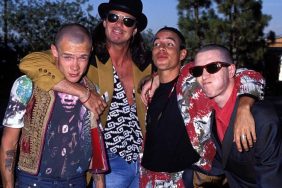The wild lands of Australia have birthed their share of musical legends over the years, with a consistent tide of torch-bearers keeping the fire lit for the homeland while bringing the sounds of the great Down Under to fans around the world.
Below, you’ll find a collection of the most successful and iconic Australian groups in music history. While newer Aussie bands such as Jet and Wolfmother work to build their legacy in today’s rock scene, their legacy has yet to be cemented in the annals of musical greatness. Also, a preemptive apology to the Rick Springfield and Olivia Newton-John fans out there, as they doesn’t qualify as “bands” – but they’ll forever hold a place in the nostalgia-laced pocket of our hearts.
AC/DC

It’s rare that a band will find jaw-dropping success after the death of their original lead singer, but that’s just what happened to the band formed in 1973 by brothers Malcolm and Angus Young. After a handful of albums established them as powerful rock forces, frontman Bon Scott headed to the big bar in the sky, and the Young brothers and company found themselves in the uncertain position of being international superstars without a voice. Lucky for them, they found the unlikeliest of replacements in Brian Johnson, a singer with a staggering ability to replicate his predecessor’s signature growling wail. The band jumped right back in the saddle, releasing Back In Black to greater success than they’d ever seen. Bucking the trends of homogenized rock to the tune of 200 million albums sold, AC/DC is still going strong today.
INXS

INXS enjoyed a spectacular music career through the 80s and 90s until the tragic death of frontman Michael Hutchence in 97. Down Under’s focal point of new wave explosion was helped in no small part by the appeal of frontman Michael Hutchence’s good looks and seductive charisma, but the band delivered some admirable artistry before going full-fledged international pop stars with 1987’s Kick. Tracks like “Need You Tonight” and “Never Tear Us Apart” became cornerstones of a pre-digital music era that’s still celebrated & covered today.
Crowded House

After the demise of the legendary Split Enz, New Zealander Neil Finn teamed up with Aussies Nick Seymour and Paul Hester (and later joined by Neil’s brother, Tim Finn, also from Split Enz) for a project that was not only hugely promising artistically, but was met with nearly instant success. Crowded House, known as The Crowdies by their homeland fans, enjoyed two decades of international stardom with classics like “Don’t Dream It’s Over” and “Weather With You,” before an epic farewell concert outside the Sydney Opera House in 1996. After drummer Paul Hester sadly passed away in 2005, the surviving bandmembers reconciled and Crowded House reunited in 2006, continuing to rock the world to this day.
Men At Work

Guilty pleasure ’80s heroes Men at Work brought their music to the world stage, and established an Australian cultural identity in American pop culture. The band first hit international success with the song “Who Can It Be Now?,” which topped the charts in America. “Down Under” was the follow-up single that cemented their place as ’80s icons and earned them an immortal adoration, as well as the distinction of being the only Australian band with a #1 album (Business as Usual) and a #1 song at the same time. The band went their separate ways by the end of the ’80s, but occasionally reunite for charity events.
Silverchair

The little grungy runts who won a radio contest for studio time answered opportunity’s knock to evolve into symphonic-rock iconoclasts. Their stylistic leaps and evolution as players – particularly frontman Daniel Johns – led to remarkable albums such as 2002’s Diorama, an orchestral prog-rock opus that’s a far cry from the Nirvana call-outs of their flannel-jockeying debut Frogstomp. Creative differences led to their 2011 split, but there’s still a chance that they’ll awaken the band from “indefinite hibernation” sometime in the future.
More on Page 2…
Midnight Oil

With the political passion of U2 and the visual oddity of a bald ostrich, Midnight Oil wowed and bewildered audiences worldwide with their breakthrough hit “Beds Are Burning,” an anthem depicting the struggles of Australian Aborigines. Fronted by activist (and now politician, as Australia’s Minister for School Education, Early Childhood and Youth) Peter Garrett, the band’s 80s success rose in tandem with their intense and uncompromising stand on political and environmental affairs. The group went their separate ways in 2002, but have performed occasional reunion shows for charity, and are credited for having an impact on Aussie culture, as well as exporting local issue awareness to the world.
Nick Cave and the Bad Seeds

Nick Cave’s massive influence on the international circuit didn’t come on the heels of a catchy era-specific pop jam. His uncompromising artistry as an influential Australian musician, artist, songwriter and performer carried Cave through the demise of Birthday Party into a new band called Nick Cave and The Bad Seeds. With the 1996 release of the album Murder Ballads, Nick Cave and the Bad Seeds would be the recipients of three ARIA awards, including Song of the Year for the duet with Kylie Minogue, “Where the Wild Roses Grow”. Now with new project Grinderman keeping his creative spark sharp, Nick Cave continues to push boundaries and kick ass with his haunting, brooding voice.
Bee Gees

Though they were born in England (and eventually returned), the brothers Gibb – Barry, Robin and Maurice – moved to Brisbane, Australia in their early teens and developed the three-part high-voiced harmonies that would catapult them to international superstardom. Their names are synonymous with the ’70s disco era to this day, thanks to their inclusion on the Saturday Night Fever soundtrack and the smash popularity of songs like “Stayin’ Alive” and “How Deep Is Your Love?”. The Bee Gees’ career record sales total a staggering 220 million albums, and they were inducted into the Rock and Roll Hall of Fame in 1997. Following Maurice’s sudden death in 2003, the remaining brothers announced the end of the Bee Gees.








